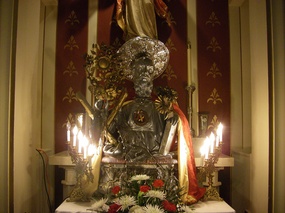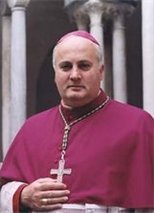 New Haven has many residents whose family hails from Amalfi, Italy. The Italian heritage society, The Saint Andrew Society of New Haven (Società di Sant'Andrea Apostolo), draws the old time Italians, most by now have only an affection of Amalfi but neither speak the Italian language nor have been to the beautiful sea-side town.
New Haven has many residents whose family hails from Amalfi, Italy. The Italian heritage society, The Saint Andrew Society of New Haven (Società di Sant'Andrea Apostolo), draws the old time Italians, most by now have only an affection of Amalfi but neither speak the Italian language nor have been to the beautiful sea-side town.The enchanted and beautiful lush area not far from Naples. Amalfi, as you know, over the years has been the resting place of the relics of the brother of Peter, fisherman and first-called by the Lord, Saint Andrew the Apostle. His relics have been in Amalfi since the 13th century (brought to the Italian city by crusaders coming back from Constantinople). A small relic of Saint Andrew is venerated here in New Haven at The Church of St Michael. This parish is recognized as the first spiritual home of the Italian community for more than 150 years. And gratefully so for us to have one of the closest connections to Our Savior and to the Prince of the Apostles!
As a good will gesture and a sign of friendship, Archbishop Orazio Soricelli, 58, led a small delegation from the Archdiocese of Amalfi-Cava de'Terreni to the USA this week. For many years now there has been a reciprocal relationship between Amalfi and New Haven. Archbishop Soricelli made a stop in NYC to celebrate the Sacrifice of the Mass at the Cathedral of Saint Patrick and today he celebrated the Votive Mass of Saint Andrew (in advance of his feast November 30th feast day). The great sacrifice, missionary activity and friendship demonstrated by the Brother of Peter and First Called Apostle reminds us not live superficial lives of Christian faith but to be men and women focused on the Lord's face, living a life of sacrifice and teaching the faith by words and action. As Saint Andrew lived and died, so our vocation should the same: to offer our lives in sacrifice, faith and friendship with the Lord for the building of the Kingdom of Heaven.
The Archdiocese of Amalfi is an ancient Episcopal See of Christian faith. History is unclear as to when the Gospel was first proclaimed there but it is know that Pope Saint Gregory the Great spoke of the Christian faithful in Amalfi in the 6th century and we know of the presence of monks living in the region. The Church can verify pastoral activity in Amalfi because it has a list of bishops dating from 829.

Archbishop Soricelli is celebrating 10 years of episcopal ordination and pastoral leadership in Amalfi and humbly asked for us to remember him in prayer, particularly asking the Mother of God and Saint Andrew to ask the Good Shepherd to continue to bless him.
On a liturgical note, many members of the congregation no longer have the respect that Catholics ought to have at Mass. Part of the problem lies in the fact the clergy show little respect themselves in the sanctuary by talking and not reverencing the Blessed Sacrament. Sitting in the church trying to prepare for the Eucharistic celebration one could not be but disturbed by the loud talking and "carrying-on" of so many people. The loss of silence --the language in which God often communicates with us-- was imperceptible. The effect of no silence prior to the sacred Mysteries being celebrated disorients one's soul. It removes the sensibility of sacredness and from fully entering into Sacrament of Unity and Peace! What was also most revelatory disrespect was the several conversations being conducted during the Mass: during the Archbishop's homily, during the Preparation of the Altar, during the distribution of Holy Communion and following. Can you believe talking in church during Mass, talking which had no importance or emergency? What surprised me was the clear departure from the sacredness of space and time when the tabernacle door was open. Some clear-minded people would identify these acts as abuses of the the Kerygma of the Gospel and the Blessed Sacrament.
The music for the Liturgy was so poorly done, not only several key mistakes, not the least with the organist telling the congregation that singing the entrance hymn was sung to greet the celebrants and other ministers; that our singing would welcome them into the church. Really!!???!!! That was not what I was taught when I earned my MA in liturgical studies. But may be Popes John Paul II and Benedict XVI changed the Church's understanding of the entrance antiphon or hymn. With such poor liturgical behavior of the people at St Michael's Church, New Haven, CT, no wonder so few people are attending to beautiful worship of God.


Leave a comment